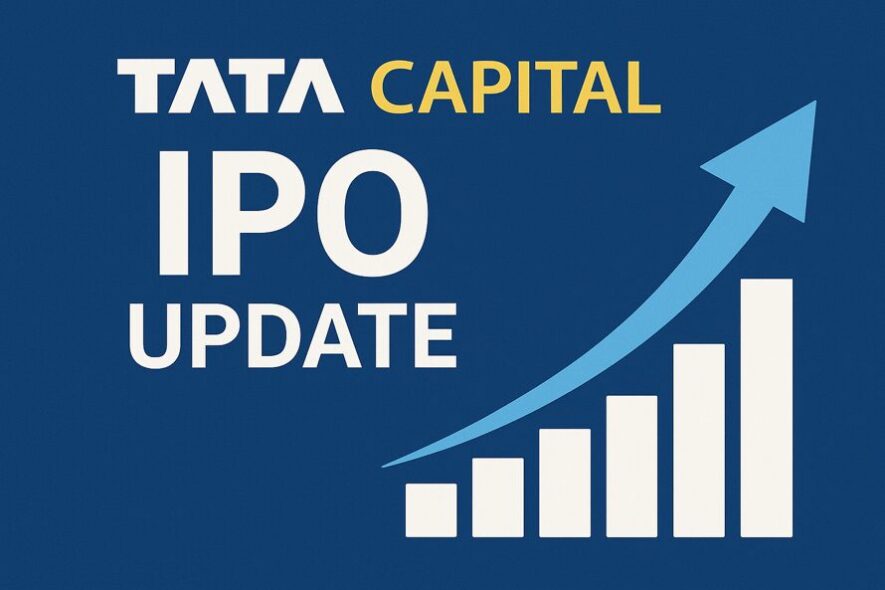Tata Capital Shares Make Flat Debut on Stock Market, List at 1.23% Premium

Tata Capital shares made their much-anticipated debut on the stock market today, but the opening was more muted than many expected. The stock listed at a modest 1.23% premium over its issue price, signaling a flat start despite strong investor interest during the pre-listing phase.
Key Listing Highlights
- Listing Price: ₹310.80
- Issue Price: ₹307
- Premium: 1.23%
- Stock Exchanges: BSE and NSE
- Market Sentiment: Neutral to mildly positive
Why the Flat Debut?
Despite being part of the trusted Tata Group and having a strong presence in the financial services sector, Tata Capital’s listing failed to deliver a big bang opening. Here’s why:
1. Stretched Valuations
Investors may have priced in the company’s growth prospects already. The 1.23% premium suggests that there wasn’t much room left for immediate upside at listing.
2. Broader Market Sentiment
The Indian stock market has been experiencing some volatility due to global cues, interest rate concerns, and profit-booking ahead of earnings season. This may have tempered enthusiasm across the board.
3. High Expectations
When a company like Tata Capital goes public, expectations are sky-high. A strong reputation can sometimes lead to oversubscription in the IPO phase but doesn’t always translate into a strong debut if investors feel the pricing was aggressive.
About Tata Capital
Tata Capital is a major non-banking financial company (NBFC) under the Tata Group umbrella. It offers services like:
- Consumer loans
- Home and auto financing
- Business and SME lending
- Wealth management and investment services
The company has seen steady growth in recent years, especially in the retail lending space, and has a strong brand trust factor among Indian consumers.
What Should Investors Do Now?
If you were allocated shares in the IPO:
- Short-term investors: Watch the price movement over the next few days. A stable debut may suggest slow accumulation before a potential move.
- Long-term investors: Consider holding. Tata Capital’s fundamentals remain strong, and the NBFC sector is poised for steady growth.
If you missed the IPO:
- Wait for stability: Let the stock settle for a few trading sessions before jumping in.
- Watch earnings reports: Keep an eye on upcoming quarterly results for more insight into growth trajectory and valuations.
Market Reaction
Analysts have mixed views:
- Some believe the muted listing reflects cautious optimism and a realistic valuation.
- Others feel it’s a missed opportunity for a better opening pop, especially given the Tata brand.
Either way, the market will now focus on Tata Capital’s execution in the coming quarters.
FAQs
Q: Is Tata Capital a good stock for long-term investment?
A: Yes, it has strong fundamentals, a trusted parent group, and a growing presence in key lending segments. However, consider your risk appetite and do your research before investing.
Q: Why didn’t Tata Capital stock rise sharply on listing?
A: Market volatility, high expectations, and fair pricing likely led to the flat debut.
Q: Can I buy Tata Capital shares now?
A: Yes, it’s available on BSE and NSE. However, wait for a few sessions to see if the price stabilizes or shows strength before entering.
Disclaimer
The stocks mentioned in this article are not recommendations. Please conduct your own research and due diligence before investing. Investment in securities market are subject to market risks, read all the related documents carefully before investing. Please read the Risk Disclosure documents carefully before investing in Equity Shares, Derivatives, Mutual fund, and/or other instruments traded on the Stock Exchanges. As investments are subject to market risks and price fluctuation risk, there is no assurance or guarantee that the investment objectives shall be achieved. Lemonn (Formerly known as NU Investors Technologies Pvt. Ltd) do not guarantee any assured returns on any investments. Past performance of securities/instruments is not indicative of their future performance.







